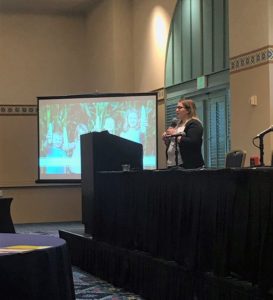Engaging Consumers in Conversations about Food and Farming
Technology in the Food System:
Blog by Tarra Rotstein, Communications Intern 
How do consumers connect with the phrases “sustainable agriculture“, “gene editing” or even “stewardship”? What kind of transparency do consumers need about their food products? Most importantly how do we keep consumers knowledgeable about food, so they feel comfortable with technological innovations?
These are just some of the questions that drove solutions-based conversations at the Center for Food Integrity Conference. According to their website, the Center for Food Integrity is an organization that “empowers those in the food system to meaningfully engage with their most important audiences on issues that matter.”
The conference hosted professionals from across the United States who work for commodity groups, cooperatives, Farm Bureaus, universities and government. During the conference, I heard from industry professionals about research in engaging with consumers about agriculture. Topics ranged from research on certain phrases in agriculture messaging, earning consumer trust and how blockchain can satisfy the transparency consumers crave.
One of the best parts of the conference was the chance to hear from other states to learn what they are doing and what is working for them. This is the perfect chance to “collabor-a-steal”, steal another’s idea but make it your own. Kansas Corn was invited to present its education program, Kansas Corn STEM. The consumer engagement done through the education program goes beyond allowing people to learn about agriculture, it engages K-12 students in their course work through the example of corn. I have been able to have an inside peek at some of the labs and (wow) my college biology class didn’t even teach me what these high schoolers are learning.
Farmers: what do you need to know about this conference?
- Consumers are listening to you on Twitter, Facebook and Instagram. Make sure to not only represent yourself in a positive light but also the industry.
- Consumers feel you are a trusted source to learn about food. Be sure to share your values with them.
- Make it simple, cut out the jargon. Don’t talk down to them though we are all professionals in our own fields.
- Be patient. Your mind wouldn’t be changed through one conversation from a stranger and theirs won’t either.
- Give them resources and let them know you are happy to answer questions or direct them to someone else who can answer those questions.
After all, we all want safe and affordable food for our families.
